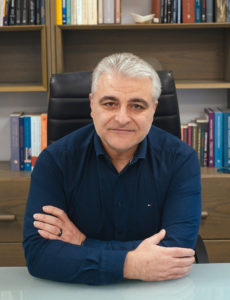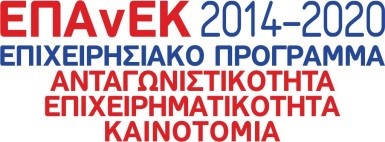
Nektarios Tavernarakis, Chairman of the Board of Directors of the Foundation for Research and Technology-Hellas (FORTH) and Professor at the Medical School of the University of Crete, is awarded the Bodossaki Excellence Award in the field of Biomedical Sciences, following a unanimous decision of the International Scientific Committee and the Board of Directors of the Bodossaki Foundation. He is the eighth scientist to be awarded this high distinction for his decisive contribution to the advancement of his scientific field, since the Award was first introduced in 2002.
As noted on the relevant page of the Bodossaki Foundation web site: “The Bodossaki Excellence Award has been established to pay tribute to and raise the public profile of Greeks who have devoted their lives to science and whose outstanding performance and important work have made a particularly significant contribution to the advancement of their scientific disciplines. The purpose of the Excellence Award is to make known to the public internationally acclaimed Greek scientists active in Physical Sciences and Mathematics as well as in Technological, Biomedical and Social Sciences, who can be genuine role models for society and a source of national pride.” The main selection criteria for this highly prestigious award are academic excellence and international prominence.
Professor Nektarios Tavernarakis stood out among a large number of extremely high-caliber Greek scientists from Universities and Research Centers, worldwide. The evaluation of nominations for the Award was carried out by renowned members of scientific academies and internationally acclaimed foreign scientists with the highest distinctions in their fields (Nobel, Spinoza, and Turing Prize winners). Notably, no self-nominations are accepted; instead, proposals for the Αward are submitted by other distinguished scientists from around the world.
The Bodossaki Excellence Award, together with several other notable distinctions at the national, European and international level, exemplifies the significant impact of Prof Tavernarakis’ work on the broad biomedical research and academic community. It is worth noting that he is the only Greek to have been elected to high-level positions in two of the most important European organizations, supporting research and innovation, internationally, by serving as Chairman of the European Institute of Innovation and Technology (EIT), and, until recently, as Vice-Chairman of the European Research Council (ERC).
Prof. Tavernarakis remarked: “I am greatly honored and deeply moved to receive the Bodossaki Excellence Award. I am particularly thrilled as this momentous recognition was the outcome of a rigorous and highly competitive evaluation of candidates, by eminent, internationally acclaimed scientists from abroad, following an extensive process of collecting nominations, submitted by distinguished colleagues. This exceptional distinction has a special, personal significance for me, as the Bodossaki Foundation had also awarded me the Scientific Prize in Medicine and Biology at the beginning of my academic career, almost 20 years ago. The strictly meritocratic and thorough assessment, the impartial procedures, combined with the highest standing of the Evaluation Committee Members, add even more significance and unique merit to these Excellence Awards, which are two of the most prominent scientific distinctions for Greek scientists, in Greece and abroad. I believe that this accomplishment highlights the research efforts, competence, and excellence of the Country’s scientific community, essentially promoting the value of scholarly endeavor and erudite work, which is so much needed in our challenging times.”
The award ceremony will take place on June 25, 2024, at the Pavilion of the Zappeion Palace, by H.E. President of the Hellenic Republic and the President of the Bodossaki Foundation.
Short Biography
Nektarios Tavernarakis is Professor of Molecular Systems Biology at the Medical School of the University of Crete, in Heraklion, Greece. He is also the Chairman of the Board of Directors at the Foundation for Research and Technology-Hellas (FORTH), and Research Director at the Institute of Molecular Biology and Biotechnology (IMBB) of FORTH, where he is heading the Neurogenetics and Ageing laboratory. He is the Founder and first Director of the Graduate Program on BioInformatics at the University of Crete. He is Chairman of the European Institute of Innovation and Technology (EIT) Governing Board, and has served as Vice President of the Scientific Council of the European Research Council (ERC), and Director of IMBB. His work focuses on the molecular mechanisms of necrotic cell death and neurodegeneration, the interplay between cellular metabolism and ageing, the mechanisms of sensory transduction and integration by the nervous system, and the development of novel genetic tools for biomedical research. He has published numerous scientific papers in top-tier, cross-discipline, international scientific journals, in addition to invited book chapters, and other publications, including editorials, commentaries, and science-popularizing articles.
His research has been commended internationally, and is supported by highly competitive funding from the European Union, international organizations and the Greek Government. For his scientific accomplishments, he has received several notable scientific prizes, including two ERC Advanced Investigator Grants, and an innovation-supporting ERC Proof of Concept Grant. He is also the recipient of the EMBO Young Investigator award, the Alexander von Humboldt Foundation, Friedrich Wilhelm Bessel research award, and the Helmholtz International Fellow Award. He is also the recipient of the Scientific Prize for Medicine and Biology, and the Excellence in Biomedical Sciences Award, of the Bodossaki Foundation, which are two of the most competitive scientific distinctions for Greeks, in Greece and abroad. He is the only Greek scientist to have been awarded both these prestigious prizes. In addition, he has received the Galien Scientific Research Award, the BioMedical Research Award of the Academy of Athens, and the Empeirikeion Foundation Academic Excellence Prize.

















